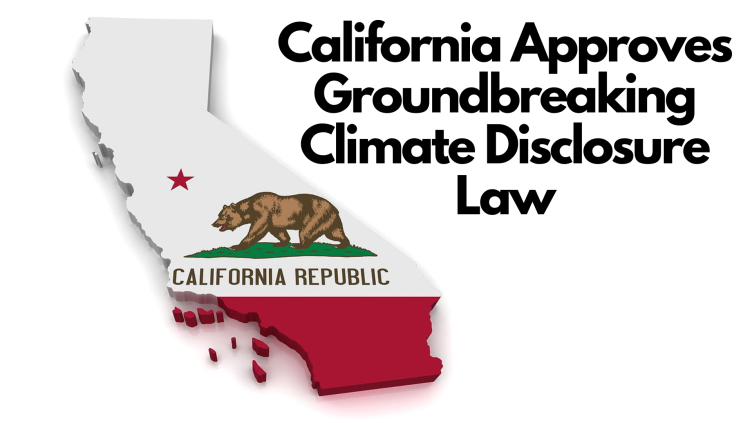Tim Mohin: California Approves Groundbreaking Climate Disclosure Laws

|
Listen to this story:
|
Europe is often perceived as ahead of the US when it comes to climate action. While political polarization over environmental issues grabs the headlines, the US has been on a winning streak regarding climate policy. It started with last year’s unprecedented Inflation Reduction Act and continued this week with the approval of two major climate bills in the most populous US State – California.
The Climate Corporate Data Accountability Act (SB 253) and Greenhouse Gasses: Climate-related Financial Risk (SB 261) were approved by the State Assembly and Senate this week. Both bills await Governor Newsom’s signature or veto by October 14 – if he does neither by that deadline, the laws will be passed.
Update: Over the weekend, as Governor Newsom attended the start of New York Climate Week, he confirmed he would sign the bills, saying, “Of course, I’m going to sign those bills.” Adding that he would not be the person to cede California’s climate leadership. However, he did say the bill’s language would need to be cleaned up a little before he signs.
SB 253 will require public and private companies with revenues above $1 billion that are “doing business in California” to disclose their “scope 1, 2, and 3” climate emissions starting in 2026. Assurance of this information will also be required on a phased schedule.
SB 261 will require companies to disclose their climate-related financial risk and measures to reduce and adapt to such risks. Reporting will also start in 2026 and be biennially thereafter.
If these bills become law, they will have a massive impact. California is the largest economy in the US and, if it were a sovereign nation, would rank as the fourth largest economy in the world. The state has a history of driving stringent environmental standards that have impacts beyond its borders – such as vehicle emission controls.
These laws will require similar, if not more stringent, climate reporting than what the Securities and Exchange Commission (SEC) proposed back in March of last year. While the final SEC rule is expected in the coming weeks, it will likely be tied up in litigation for some time.
Similar litigation can be expected in California, but for now, it looks like the Golden State, yet again, leads the nation in environmental protection policy.
Creator of SB 253, Senator Scott Wiener, said the vote was a “Huge climate win in California: …the Assembly just passed our bill to require large corporations to be transparent about their carbon footprint.”
Support Split Over Scope 3

Scope 3 climate emissions – those from a company’s value chain – can be the most difficult to report, yet are often the majority of the overall greenhouse gas footprint.
Apple came out in strong support of the California law, adding that the inclusion of Scope 3 “is essential to understanding the full range of a company’s climate impacts.” Director D. Michael Foulkes said, “Throughout our environmental journey, we’ve emphasized the importance of measurement and reporting to help us understand our impact.”
Some of the fiercest opposition came from the California Chamber of Commerce. Denise Davis of the Chamber said, “SB 253 is a costly mandate that will negatively impact businesses of all sizes in California,” adding after the vote that the chamber “remains opposed and will respectfully request the governor to veto this bill.”
Another group opposed to the bill’s addition of Scope 3 was the banking sector. In banking, most of the scope 3 emissions are “financed emissions” – or the amount of greenhouse gas emissions they support through lending and other financial transactions. Financed emissions are more than 700 times the direct emissions from banks, yet less than a third of the world’s 30 largest banks are measuring it.
Forecasts on Governor Newsom’s actions on these bills are uncertain. One TD Cowen investment banker, John Miller, claimed he “struggles to see the governor vetoing something like this,” others claim that the bill is not in the current budget, which could affect Newsom’s decision.
Miller added that companies have other ways of stopping the bill: Businesses can litigate and try to bring the issue to a referendum where Californians would vote on the final decision.
This Smart Read article is contributed by Tim Mohin, Global Sustainability Leader, BCG. Every week ESG News delivers smart commentary from ESG practitioners and experts to unpack issues of the week. Email here if you are interested in submitting an article [email protected]











